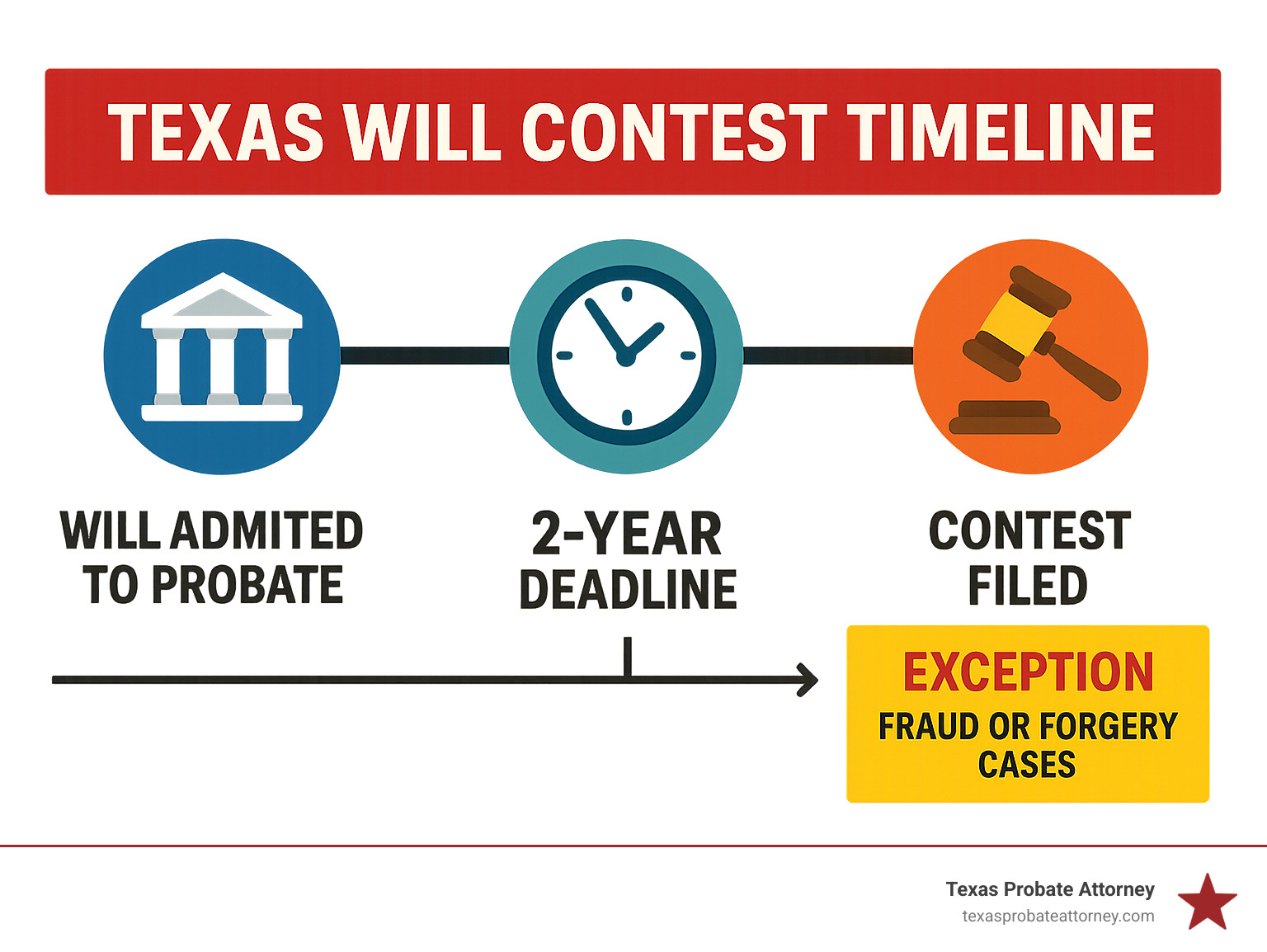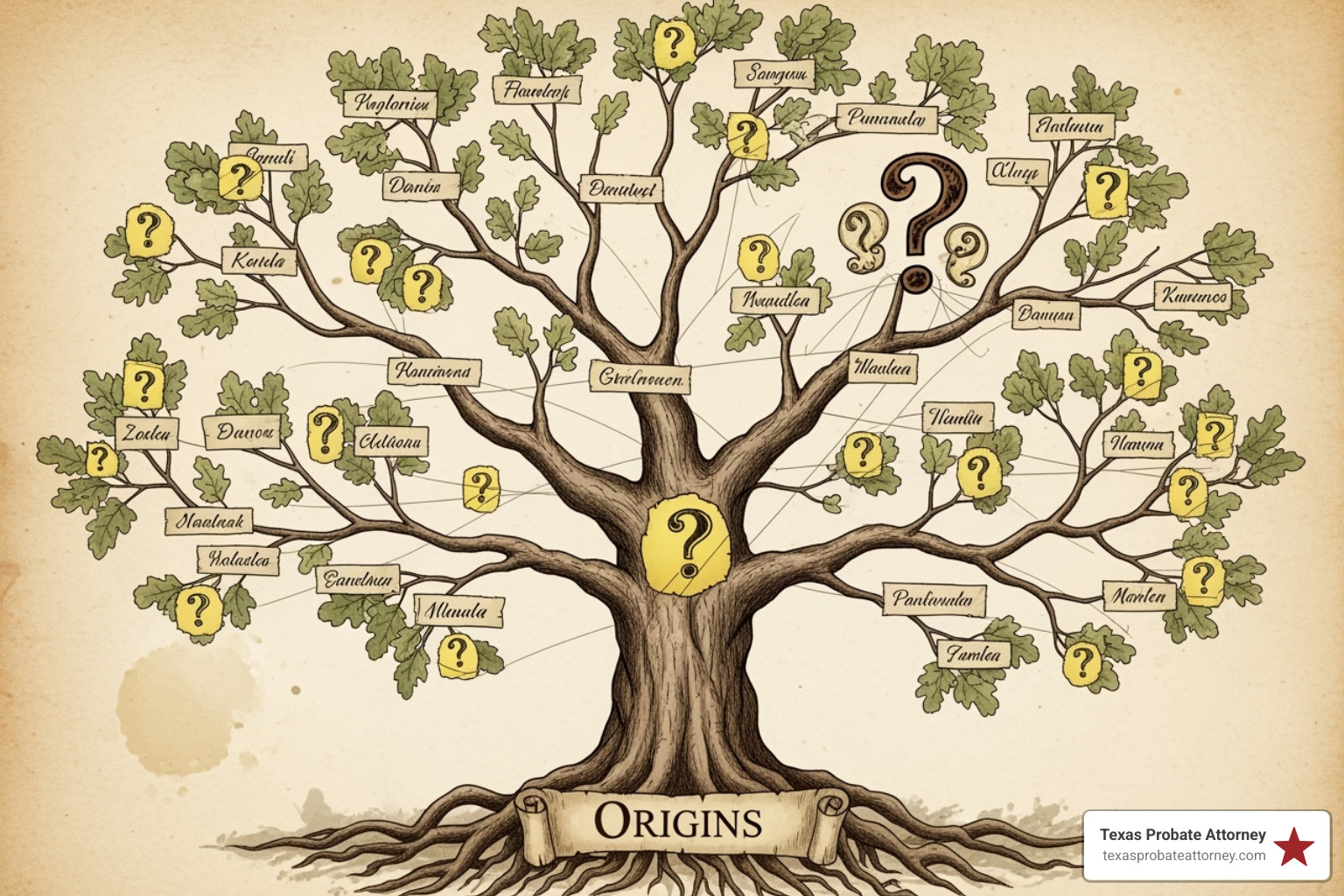The Clock is Ticking: Understanding Will Challenge Time Limits
Why Understanding Will Challenge Deadlines is Critical in Texas
The time limit for challenging a will in Texas is strictly enforced. Missing this deadline means permanently losing your right to contest, regardless of your reasons. While you are grieving a loved one in Houston, Fort Worth, or Austin, Texas probate law does not pause.
Texas Will Contest Time Limits:
- 2 years from the date the will is admitted to probate
- Clock starts ticking when probate court accepts the will
- Very limited exceptions for fraud, forgery, or incapacity
- Missing the deadline = permanent loss of rights
You have exactly two years from the date a will is admitted to probate to file a challenge. This strict timeline applies in all Texas counties, including Harris, Tarrant, and Travis. After this period, even with strong evidence of forgery or manipulation, you have likely lost your chance forever.
Families often don’t realize something is wrong until it’s too late, perhaps after finding medical records showing dementia or evidence of undue influence. If you have concerns about a will, you must understand how these deadlines work and act quickly.
Related reading:
- contesting a will in queensland time limits — a comparison to non-Texas rules; note that Texas law controls in Houston, Fort Worth, and Austin.
- contesting probate time limits — more on Texas filing deadlines and why timing is critical in Harris, Tarrant, and Travis Counties.
Who Can Challenge a Will in Texas and On What Grounds?
To contest a will in Texas, you must have legal standing and valid grounds. Probate courts in Houston, Fort Worth, and Austin require you to be an “interested party” who is directly affected by the will’s terms and to have a legitimate legal reason for the challenge.
Texas courts presume a will is valid, so the burden of proof is on the person challenging it. You cannot contest a will simply because you are unhappy with its terms; you need concrete legal reasons.
The Four Main Grounds for a Will Contest in Texas
Here are the primary legal grounds for a will contest in Texas probate courts:
Lack of Testamentary Capacity means the person making the will was not mentally capable of understanding their actions. To prove this, you must show they did not understand what property they owned, who their family members were, or that they were signing a document to distribute their assets after death.
Undue Influence occurs when a person is manipulated or pressured into changing their will against their own wishes. Courts look for sudden changes in estate plans combined with evidence that someone exerted control over the deceased’s life and decisions.
Improper Execution means the will fails to meet the basic legal requirements outlined in the Texas Estates Code § 251.001. Generally, a will must be in writing, signed by the testator, and witnessed by two credible individuals who are at least 14 years old.
Fraud and Forgery involve tricking the testator about the document they were signing or, more directly, faking a signature or the will itself. These claims can sometimes create exceptions to the time limit for challenging a will.
If you see red flags related to these issues, don’t wait. Our team has helped families identify the 3 Signs You May Need to Challenge a Will in Texas, and we know what to look for.
Who is an “Interested Party” in a Texas Probate Case?
Even with valid grounds, you can only challenge a will if you are an “interested party,” meaning you have a direct financial stake in the outcome. This includes:
- Heirs-at-law: Individuals who would inherit under Texas law if no will existed (e.g., spouse, children, parents).
- Named beneficiaries in the current will: Those who believe their inheritance was improperly reduced.
- Beneficiaries from a previous will: Individuals who were set to inherit more under a prior, valid will.
- Certain creditors of the estate: In specific situations where the will’s terms prevent the collection of a legitimate debt.
If you stand to gain or lose financially depending on the will’s validity, you likely have the right to challenge it. Understanding these requirements is crucial, because the time limit for challenging a will only matters if you have the legal right to act. Don’t waste precious time; seek guidance on grounds for challenging a will before the deadline passes.
The Official Time Limit for Challenging a Will in Texas
Now, let’s get to the heart of the matter: the time limit for challenging a will in Texas. This is where many families get caught off guard, and it’s why acting quickly is absolutely critical to protecting your rights.
Understanding the Two-Year Statute of Limitations
You have exactly two years from the date a will is admitted to probate to file your challenge. The clock starts the moment a probate court in Harris, Tarrant, or Travis County officially accepts the will, not from the date of death.
This statutory period to contest a will is firm. Missing this deadline means losing your right to challenge the will forever, regardless of how strong your evidence might be. We’ve seen families in Houston find clear proof of fraud just days after their deadline expired, only to learn there was nothing that could be done.
This is particularly challenging because evidence of issues like dementia or manipulation may not surface until well into the two-year window. Therefore, if you have any concerns about a will in Houston, Fort Worth, or Austin, you must act immediately. The contesting probate time limits in Texas don’t pause for investigation.
Exceptions That Can Extend the Time Limit for Challenging a Will
While Texas probate courts are strict, a few narrow exceptions might extend your time limit for challenging a will. These are rare and require specific circumstances.
Fraud or forgery found after the deadline is the most common exception. You must prove the deception was so well-hidden that it could not have been found earlier with reasonable effort. Courts will scrutinize whether you should have found the evidence sooner with reasonable diligence.
Minors who were affected by the will are protected under Texas law. The two-year clock for a minor beneficiary doesn’t start until they reach the age of 18.
Incapacitated individuals receive similar protections. The deadline may be paused, or “tolled,” for an interested party who was legally incapacitated when probate began, and it will not start until their capacity is restored.
These exceptions are designed for truly exceptional circumstances, not as loopholes for missing the deadline. The best protection is acting within the original two-year window. The sooner you act, the stronger your position will be.
The Step-by-Step Process for Contesting a Will
So, you’ve determined you’re an interested party, you have valid grounds, and you’re within the time limit for challenging a will. What happens next? Contesting a will is a serious legal battle that requires strategy, patience, and a clear understanding of the process in the probate courts of Houston, Fort Worth, or Austin.
Step 1: Hire a Probate Litigation Attorney
Trying to contest a will without an experienced attorney is not advisable. Will contests involve strict procedural rules, complex evidence requirements, and the local rules of probate courts in Harris, Tarrant, and Travis Counties.
When you contact our office, we start with a consultation to evaluate your case, review your documents, and provide an honest assessment of your chances. Stacy Kelly and our legal team bring over 40 years of combined experience to every case. We develop a strategy custom to your situation and the specific court where your case will be heard, focusing on aggressive litigation aimed at quick resolutions.
Step 2: File a Formal Will Contest in the Correct Court
Your attorney will draft and file a formal will contest petition. This legal document establishes your standing, outlines the specific grounds for your contest (e.g., lack of capacity, undue influence), and states the relief you are seeking, such as having the will thrown out or probating a previous will.
After filing the petition with the appropriate probate court, all interested parties, including the executor and beneficiaries, must be formally served with notice that you are challenging the will. This is a necessary legal step to protect your rights.
Step 3: Findy and Evidence Gathering
This phase, known as findy, is where both sides gather evidence for their case. While your lawsuit must be filed within the time limit for challenging a will, findy then proceeds under the court’s scheduling orders in Houston, Fort Worth, or Austin. The process can include:
- Document Requests: Seeking medical and financial records, previous versions of wills, and communications between the testator and potential influencers.
- Depositions: Taking sworn, out-of-court testimony from witnesses, such as family members, caregivers, doctors, or the attorney who drafted the will.
- Expert Testimony: Engaging medical experts to assess capacity or forensic document examiners to analyze signatures for forgery claims.
The goal is to build a case with clear and convincing evidence. Many cases settle during or after findy once the strength of the evidence is clear. If a fair settlement cannot be reached, our team at Will Contest Lawyer Texas is fully prepared to take your case to trial in Houston, Fort Worth, or Austin.
Special Circumstances Affecting Will Challenges in Texas
These special circumstances can dramatically affect your rights and strategy. Let’s walk through the most common ones we see in our practice in Houston, Fort Worth, and Austin.
What if Someone Refuses to Hand Over the Will?
It is illegal to hide or destroy a will in Texas. Under Texas Estates Code, Section 252.201, anyone who has custody of a will must deliver it to the executor or file it with the county clerk after learning of the person’s death. This applies in Harris County, Tarrant County, and Travis County.
If someone refuses, a probate judge in Houston, Fort Worth, or Austin can issue a court order compelling them to produce the will. If they still refuse, the judge can order their arrest and hold them in jail until they comply. Intentionally destroying, hiding, or altering a will is a state jail felony in Texas, which carries serious consequences.
We have helped families in Houston, Fort Worth, and Austin track down hidden wills and force their production. For more information, see our guide on Contesting a Will in Texas.
How Do “No-Contest” Clauses Work in Texas?
A “no-contest” clause, or “in terrorem clause,” states that a beneficiary who challenges the will and loses will forfeit their inheritance. These clauses are designed to discourage contests in Houston, Fort Worth, and Austin probate courts.
However, Texas law provides a crucial exception: if you challenge the will in good faith and with just cause, you will not be disinherited even if your challenge fails. This means you had reasonable grounds to believe something was wrong with the will. An attorney can help you seek a declaratory judgment from the probate court in Harris, Tarrant, or Travis County to rule on whether your planned challenge would trigger the clause before you proceed.
How Does Divorce Affect a Texas Will?
In Texas, divorce has an automatic effect on a will. When you get divorced, the law automatically treats your ex-spouse as if they died before you for the purposes of your will. Any provisions naming your ex-spouse as a beneficiary, executor, or trustee are automatically voided.
The property that would have gone to your ex-spouse typically goes to the alternate beneficiaries named in the will or, if there are none, is distributed according to Texas intestacy laws. For residents of Houston, Fort Worth, and Austin, this rule can create unintended consequences for other family members. It is always best to update your estate plan after major life changes like a divorce to ensure your wishes are accurately reflected and avoid confusion in the probate courts of Harris, Tarrant, and Travis Counties.
Frequently Asked Questions about Will Contest Deadlines
We get many calls at our Houston, Fort Worth, and Austin offices from people concerned about will contest deadlines. Here are answers to the most common questions we hear.
Can a will be contested after the estate has been distributed?
Yes, but it is exceptionally difficult and costly in the probate courts of Houston, Fort Worth, and Austin. If you are still within the time limit for challenging a will, you can file a contest. However, once assets have been distributed, you face the additional burden of tracing the property and potentially filing multiple lawsuits against different beneficiaries to recover it.
The legal costs can skyrocket, and the burden of proof remains on you to prove both the will’s invalidity and where the assets went. It is always best to act before the estate is distributed in Harris, Tarrant, or Travis County. If you are facing this scenario, you can read more about Contesting Will Texas After Probate.
Can a family member be completely disinherited in a Texas will?
Yes, in Texas, a person can legally disinherit their adult children. A will in Houston, Fort Worth, or Austin can explicitly state that a child receives nothing or a nominal amount like $1.00.
However, a surviving spouse has significant protections under Texas law. As Texas is a community property state, a surviving spouse is entitled to their half of the community property acquired during the marriage, which cannot be given away in a will. They also have homestead rights, which generally allow them to live in the family home for life, regardless of the will’s terms. These spousal protections are a critical aspect of probate law in Harris, Tarrant, and Travis Counties.
What is the time limit for challenging a will if I was never notified of the probate?
Unfortunately, in Harris, Tarrant, and Travis County courts, the two-year clock typically starts when the will is admitted to probate, whether you received personal notice or not. The law generally expects interested parties to be diligent in monitoring a deceased family member’s estate.
While lack of notice is not a guaranteed exception, it can be a factor in your favor if you can prove you had no way of knowing about the probate and acted immediately upon finding it. If you learn of a probate filing, even late in the two-year period, you must contact a probate attorney in Houston, Fort Worth, or Austin without delay. Every day matters when you’re up against the time limit for challenging a will.
Conclusion
If you suspect a loved one’s will is invalid, you cannot afford to wait. The time limit for challenging a will in Texas is a strict, two-year deadline from the date the will is admitted to probate. Missing this deadline in Harris, Tarrant, or Travis County probate courts means losing your right to seek justice.
Texas probate law doesn’t pause for grief or family drama. The clock is ticking from day one, but you don’t have to face this alone.
At Texas Probate Attorney, Stacy Kelly and our legal team bring over 40 years of combined experience to these complex cases. We understand the local court systems in Houston, Fort Worth, and Austin and are dedicated to protecting your family’s future. We provide aggressive litigation and personalized attention to handle the legal battle while you focus on healing.
Don’t let the time limit for challenging a will expire on your rights. We’re here to make sure you don’t miss your window.
Ready to protect your rights? Learn more about contesting a will in Texas and get the personalized assessment your case deserves.







